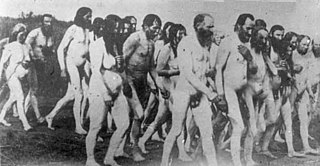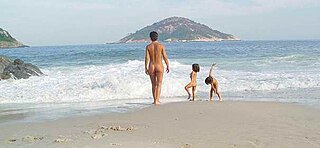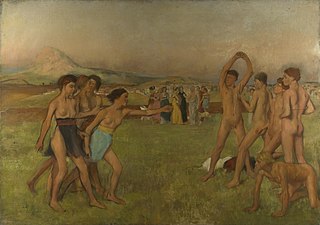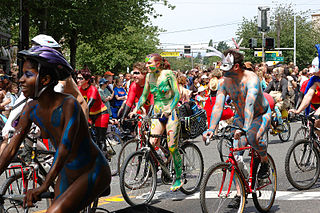
Naturism is a lifestyle of practicing non-sexual social nudity in private and in public; the word also refers to the cultural movement which advocates and defends that lifestyle. Both may alternatively be called nudism. Though the two terms are broadly interchangeable, nudism emphasizes the practice of nudity, whilst naturism highlights an attitude favoring harmony with nature and respect for the environment, into which that practice is integrated. That said, naturists come from a range of philosophical and cultural backgrounds; there is no single naturist ideology.

The World Naked Bike Ride (WNBR) is an international clothing-optional bike ride in which participants plan, meet and ride together en masse on human-powered transport, to "deliver a vision of a cleaner, safer, body-positive world." The first ride happened in Zaragoza (Spain) in 2001.

A clothing-optional bike ride is a cycling event in which nudity is permitted or expected. There are many clothing-optional cycling events around the world. Rides may be political, recreational, artistic, or a unique combination thereof. Some are used to promote topfreedom, a social movement to accord women and girls the right to be topless in public where men and boys have that right.

The Solstice Cyclists is an artistic, non-political, clothing-optional bike ride celebrating the summer solstice. It is the unofficial start of the Summer Solstice Parade & Pageant, an event produced by the Fremont Arts Council in the Fremont district of Seattle.
A naked party, also known as nude party, is a party where the participants are required to be nude. The parties have become associated with college campuses and with college-aged people; they gained prominence after naked parties were organized at Brown University and Yale University. While the roots of naked parties come from the nudism movements and campus streaking, the modern "naked party" movement appears to have its roots at Brown University in the 1980s. Attendees of naked parties often report that they stop feeling awkward after just a few minutes since everyone has disrobed before entering the party and since everyone's nudity is accepted, regardless of body type. According to reports, most naked college parties are sex-free. At Brown University, the nakedness is "more of an experiment in social interaction than a sexual experience".

The Freikörperkultur (FKK) is a social and health culture that originated in the German Empire; its beginnings were historically part of the Lebensreform social movement in the late 19th century. The Freikörperkultur, which translates to free body culture, consists in the connection of health aspects of being naked in light, air and sun with intentions to reform life and society. It is partially identical with the culture of nudity, naturism and nudism in the sense of communal nudity of people and families in leisure time, sport and everyday life.

Christian naturism is the practise of naturism or nudism by Christians.

Social nudity is the practice of nudity in relatively public settings not restricted by gender. This occurs both in public spaces and on commercial property, such as at a naturist resort.

Nude recreation refers to recreational activities which some people engage in while nude. Historically, the ancient Olympic Games were nude events. There remain some societies in Africa, Oceania, and South America that continue to engage in everyday public activities—including sports—without clothes, while in most of the world nude activities take place in either private spaces or separate clothing optional areas in public spaces. Occasional events, such as nude bike rides, may occur in public areas where nudity is not otherwise allowed.

Nudity is sometimes used as a tactic during a protest to attract media and public attention to a cause, and sometimes promotion of public nudity is itself the objective of a nude protest. The use of the tactic goes back to well published photos of nude protests by svobodniki in Canada in 1903. The tactic has been used by other groups later in the century, especially after the 1960s. Like public nudity in general, the cultural and legal acceptance of nudity as a tactic in protest also varies around the world. Some opponents of any public nudity claim that it is indecent, especially when it can be viewed by children; while others argue that it is a legitimate form of expression covered by the right to free speech.

Nudity is the state of being in which a human is without clothing. While estimates vary, for the first 90,000 years of pre-history anatomically modern humans were naked, having lost their body hair and living in hospitable climates. As humans became behaviorally modern, body adornments such as jewelry, tattoos, body paint and scarification became part of non-verbal communications, indicating a person's social and individual characteristics. Indigenous peoples in warm climates used clothing for decorative, symbolic or ceremonial purposes but were often nude, having neither the need to protect the body from the elements nor any conception of nakedness being shameful. In many societies, both ancient and contemporary, children might be naked until the beginning of puberty. Women may not cover their breasts, being associated with nursing babies more than with sexuality.

A nude beach, sometimes called a clothing-optional or free beach, is a beach where users are at liberty to be nude. Nude beaches usually have mixed bathing. Such beaches are usually on public lands, and any member of the public is allowed to use the facilities without membership in any movement or subscription to any personal belief. The use of the beach facilities is normally anonymous. Unlike a naturist resort or facility, there is normally no membership or vetting requirement for the use of a nude beach. The use of nude beach facilities is usually casual, not requiring pre-booking. Nude beaches may be official, unofficial, or illegal.

This timeline of social nudity shows the varying degrees of acceptance given to the naked human body by diverse cultures throughout history. The events listed here demonstrate how various societies have shifted between strict and lax clothing standards, how nudity has played a part in social movements and protest, and how the nude human body is accepted in the public sphere.

Social nudity is somewhat accepted in Seattle and perhaps similarly treated as in other large communities of the West Coast region, such as San Francisco and Los Angeles. There are a few non-sexualized clothing-optional and topfree events, including cycling.
Heinrich Pudor was a German Völkisch-nationalist pundit and a pioneer of the Freikörperkultur in Germany. He took the pseudonyms Heinrich Scham and Ernst Deutsch.

Richard Ungewitter was a German naturist and pioneer of the Freikörperkultur movement and one of its first organizers. There was a völkisch element in Ungewitter's ideas.
Naturism is a cultural and social movement practicing, advocating and defending social nudity in private and in public. It is particularly strong in Germany where it goes under the name Freikörperkultur (FKK). It refers to a lifestyle based on personal, family and/or social nudism in the "great outdoors" environment. Naturism grew out of the German Lebensreform movement and the Wandervogel youth movement of 1896, and has been adopted in many neighbouring European countries and was taken by the German diaspora to North America and other continents. In 1974, the International Naturist Federation (INF) defined naturism as:

Naturism refers to a lifestyle of practising non-sexual social nudity in private and in public, and to the cultural movement which advocates and defends that lifestyle. Both are also known as "nudism". Naturist organisations have existed in New Zealand since the 1930s. Although not a daily feature of public life, social nudity is practised in a variety of other contexts in New Zealand culture.














